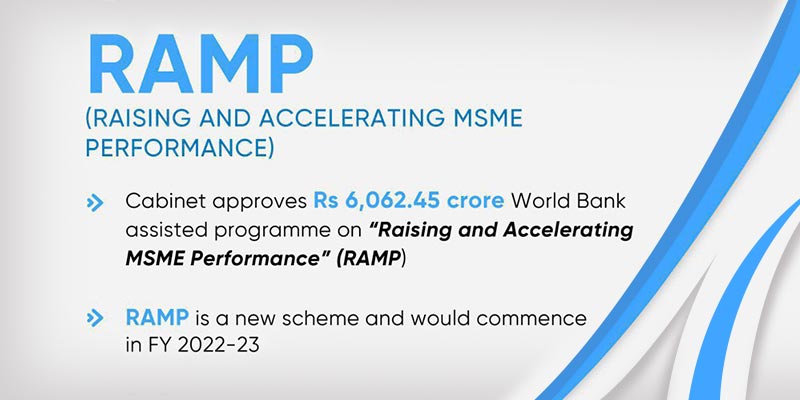- India
- Mar 31
Explainer / RAMP programme to boost MSME sector
The Cabinet Committee on Economic Affairs (CCEA), chaired by Prime Minister Narendra Modi, approved a World Bank-assisted Rs 6,062 crore ($808 million) funding programme for the small and medium businesses to help improve their access to market and credit.
Raising and Accelerating MSME Performance (RAMP) will commence in FY 2022-23.
What is RAMP?
• The government formulated and proposed RAMP for strengthening MSMEs in line with the recommendations of the U.K. Sinha committee, K.V. Kamath committee and the Economic Advisory Council of the Prime Minister (EAC-PM).
• In addition to building the MSME ministry’s capacity at the national level, the RAMP programme will seek to scale up implementation capacity and MSME coverage in states.
The programme aims to:
• Improve access to market and credit.
• Strengthen institutions and governance at the Centre and in states.
• Improve Centre-state linkages and partnerships.
• Address issues of delayed payments.
• Greening of MSMEs.
• In addition to building the MSME ministry’s capacity at the national level, the RAMP programme will seek to scale up implementation capacity and MSME coverage in states.
How will it be implemented?
• Of the total outlay under the programme, Rs 3,750 crore ($500 million) will come from World Bank loan, and the remaining Rs 2,312.45 crore will be funded by the central government.
• RAMP has identified two result areas after preliminary missions and studies. First is to strengthen institutions and governance of the MSME programme. Second is to support market access, firm capabilities and access to finance.
• Funds would flow through RAMP into the ministry’s budget against Disbursement Linked Indicators (DLIs) to support ongoing programmes of the ministry, focusing on improving market access and competitiveness.
The disbursement of funds from the World Bank towards RAMP would be made on fulfilling DLIs such as:
i) Implementing the national MSME reform agenda.
ii) Accelerating MSME sector Centre-state collaboration.
iii) Enhancing effectiveness of Technology Upgradation Scheme (CLCS-TUS).
iv) Strengthening receivable financing market for MSMEs.
v) Enhancing effectiveness of Credit Guarantee Trust for Micro and Small Enterprises (CGTMSE) and “greening and gender” delivery.
vi) Reducing the incidence of delayed payments.
• The programme will prepare Strategic Investment Plans (SIPs) in which all the states and Union Territories will be invited.
• The SIPs would include an outreach plan for identification and mobilisation of MSMEs under RAMP, identify key constraints and gaps, set milestones and project the required budgets for interventions in priority sectors, including renewable energy, rural and non-farm business, wholesale and retail trade, village and cottage industries, women enterprises, among others.
• The apex national MSME council headed by the minister for MSME will monitor and look after the policy overview of RAMP.
• RAMP programme committee headed by the secretary of MSME ministry will monitor specific deliverables.
• For day-to-day implementation, there would be programme management units at the national level and in states, comprising professionals and experts competitively selected from the industry to support MSME ministry and states, to implement, monitor and evaluate RAMP programme.
What is the significance of the scheme?
• RAMP programme will address challenges in the MSME sector. Further, the programme will bolster the inadequately addressed blocks of capacity building, hand-holding, skill development, quality enrichment, technological upgradation, digitisation, outreach and marketing promotion, amongst other things.
• RAMP programme, through enhanced collaboration with states, will be a job-enabler, market promoter, finance facilitator and will support vulnerable sections and greening initiatives.
• In states where the presence of MSMEs is on the lower side, the programme will usher in larger formalisation resulting from the higher impact of the schemes covered under RAMP. The SIPs developed by these states would act as a roadmap for the development of an improved MSME sector.
RAMP would be:
i) Policy provider through the enhanced capacity for evidence-based policy and programme design, to enable the delivery of more effective and cost-efficient MSME interventions to improve competitiveness and business sustainability.
ii) Knowledge provider through bench-marking, sharing and demonstrating best practices/success stories by leveraging international experiences.
iii) Technology provider providing access to high-end technology resulting in the digital and technological transformation of MSMEs through state of art Artificial Intelligence, data analytics, Internet of things (IoT), machine learning, etc.
• RAMP programme with impact across the country will directly or indirectly benefit all 6.3 crore enterprises under the MSME category.
• A total of 5.55 lakh MSMEs are specifically targeted for enhanced performance. In addition, expansion of target market to include service sectors and increase of about 70,500 women MSMEs is envisaged.
Manorama Yearbook app is now available on Google Play Store and iOS App Store

